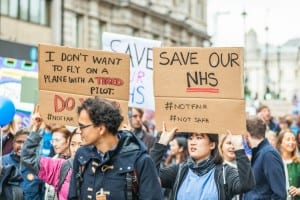Welcome to this week’s edition of the Medical News Summary blog. This week’s edition covers from the 3rd to the 10th of January and shows the main news stories relating to health. This week has shown several significant events regarding the future of the National Health Service.
NHS bursaries to be replaced with loans
This week in medical news, there have been marches down Downing Street in London by student nurses and midwives who are protesting over the chancellor’s plans to replace NHS bursaries with loans. The plans were announced in George Osborne’s spending review this November. The march started on Saturday at St Thomas’s hospital and finished at Downing Street where a series of guest speakers spoke. Members of the Royal College of Nursing (RCN) joined forces with those from the Royal College of Midwives (RCM). Janet Davies the chief executive of the RCN has emphasised that the future of nursing must be protected. Since Osborne made the announcement more than 150,000 people have signed an online petition to call on the government to retain the NHS bursary. Parliament will debate on this issue on the 11th of January. The NHS bursary has support from the labour party who back the NHS.

Junior doctors strike
In the medical news relating to the junior doctors strike, there have been further concerns over the approaching junior doctors strike. The Chief Medical Officer for England has urged that junior doctors suspend Tuesday’s strike action to prevent patient suffering. Dame Sally Davies believes that Tuesday’s strike action could lead to patient suffering. The strike will begin across England at 8:00am where junior doctors will only be providing emergency care. The British Medical Association (BMA) feel that the strikes are necessary and represent the strength of feeling amongst junior doctors over the new proposed contract. Doctors are striking over the new contract that impacts on weekend pay for junior doctors as well as other aspects. Talks between NHS bosses and the BMA will continue next week.

Sugar Tax
Also in the medical news this week, whilst David Cameron had previously ruled out a sugar tax, he has recently changed his mind and now threatens to introduce sugar tax if industry does not combat the obesity crisis. David Cameron has promised a “fully-worked up programme” later this year to combat the high consumption of sugary drinks and food in the UK. He has indicated that high sugar diets are not only increasing obesity but also contributing to heart disease, cancer and draining NHS finances. Reports of a sugar tax are thought to be part of the Government’s upcoming strategy for tackling childhood obesity. This move comes after there has been considerable publicity indicating the dangers of hidden sugar.
GP surgeries struggling to cope with patient demands
In other medical news, new figures indicate that at least one hundred General Practice surgeries are reported to have applied to stop taking on new patients. Practices are finding it difficult to cope with the increasing demand from patients and have a lack of resources to meet demands. Lack of resources includes a decrease in the number of GPs available. Closing the application list allows GP surgeries to treat patients to high level and ensure that patients can get appointments when they need them. The GP magazine, Pulse, has said that the shortage has caused a 9% vacancy rate in surgeries which is an increase on last year’s 6%. Over half of the surgeries who applied to stop taking on new patients in 2014-2015 had their request denied or withdrew their request.
Uploaded by Joelle on 11th January, 2016
